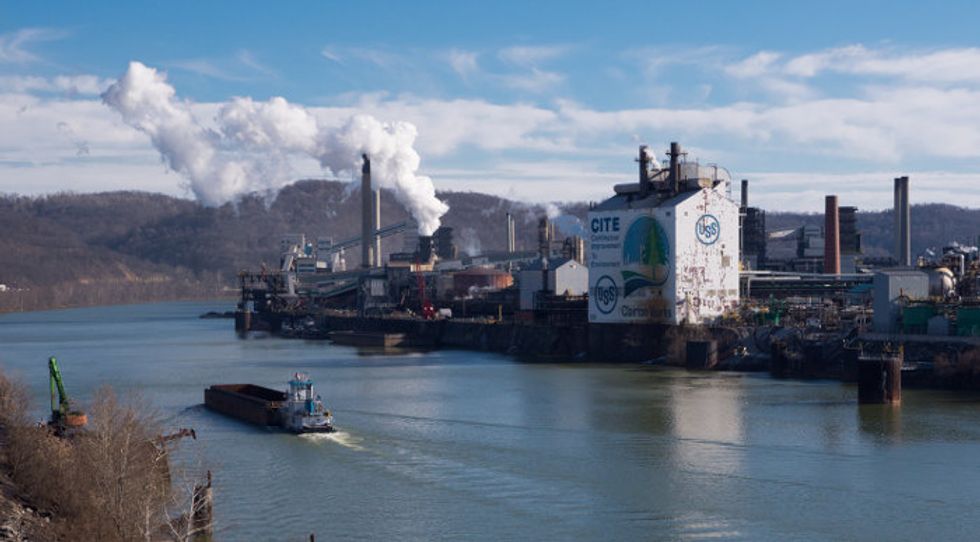While news of the merger has made political waves nationally and internationally, members of environmental justice communities in the Pittsburgh area who have experienced High risk Asthma, lung disease and cancer have been going unheard for generations as a result of harmful US steel emissions.
New Federal Coke Oven Regulations
American steel coke plant Cullerton.
Credit: Mark Dixon/Flickr
Greenhouse gases from coke ovens, which convert coal into coke, a key ingredient in steelmaking, contain chemicals such as benzene, formaldehyde and heavy metals. Coke emissions are carcinogenic and are also linked to lung and respiratory diseases.
There are coke ovens in it 11 places across the United States, including Indiana and Alabama, but the largest coke plant in the country is United States Steel Works at Clairton Cokeabout 16 miles southeast of Pittsburgh. The communities surrounding the plant regularly see some of the highest levels of daily air pollution in the country. US Steel also has several other steel mills in the Pittsburgh area.
On July 5, the US Environmental Protection Agency (EPA) imposed New regulations For coke ovens to reduce emissions of hazardous chemicals such as benzene, mercury, lead and arsenic. Under the federal Clean Air Act, the EPA is supposed to update coke oven regulations every eight years, but it hasn’t done so since 2005, only issuing new rules. After the complaint by environmental groups about the delay.
“For decades, the EPA ignored coke oven standards and allowed cancer-causing pollutants to harm communities in Pennsylvania, Alabama, Indiana, Michigan and Ohio,” said Tosh Sagar, an attorney with Earthjustice, one of the advocacy groups that filed the lawsuit. . “These communities have suffered enough,” he said in a statement.
A spokesman for Pittsburgh-based U.S. Steel said in a statement at the time that the company was “concerned” the new rules would result in “unprecedented costs” and He called them “Unattainable.” But environmental health advocates say the new rules don’t do enough to prevent cancer in people who live near the facilities.
“These communities have suffered enough.” – Tosh Sagar, earthly justice
On Sept. 3, a group of environmental health advocacy groups, including the Clean Air Council and PennEnvironment, filed the lawsuit. Another federal lawsuit In contrast, the EPA, which has called for stronger regulations for benzene, says the recently updated rules will still result in communities where coke oven plants are exposed to dangerous levels of the carcinogen.
Air monitoring devices around US Steel’s Clairton coke plant and other coke plants by the Environmental Integrity Project, an environmental advocacy group, It detected dangerous levels of benzene.
Meanwhile, US steel executives recently threatened If Biden blocks the Nippon Steel deal, closes the company’s Pittsburgh-area facility and moves its headquarters out of the region, saying it As a result, 3,800 union jobs will be lost in the region.
“Subjecting the community to continued uncertainty about its future by threatening to relocate the headquarters and close the factory in a negotiation ignores the real social harms experienced by residents and workers who are being manipulated without regard for their well-being,” Mohalik said. Stop the 150-year trend of ignoring people affected by bad investment decisions.
Protesters noted that the company has a long history of breaking promises to clean up its operations in the region. Reversal of plans for a $1.5 billion equipment upgrade that will significantly reduce harmful emissions at its Pittsburgh plants while creating up to 1,000 additional union jobs for the region by 2021, as a recent example.
Weather activists have also used the news of the merger to raise awareness about US Steel and Nippon Steel. Continued reliance on coalUnlike the competitors of this industry who are decarbonizing by increasing their capacity for green steelmaking.
Nippon Steel has pledged to spend $2.7 billion on upgrades at U.S. steel mills if the deal goes through, including at least $1 billion in the Pittsburgh area, prompting U.S. Steel workers who support the deal. to show Outside US Steel’s Pittsburgh headquarters, signs read, “Nearly $3 Billion Reasons to Say Yes,” but environmental health advocates remain wary.
“Throwing around $3 billion in vague investment figures further exposes our region to stressful uncertainties without specific solutions to the real needs of the community,” Mahalik said. “Talk to the residents. Listen to what they need.”
#Michigans #clean #energy #faces #challenges #natural #gas #plants
